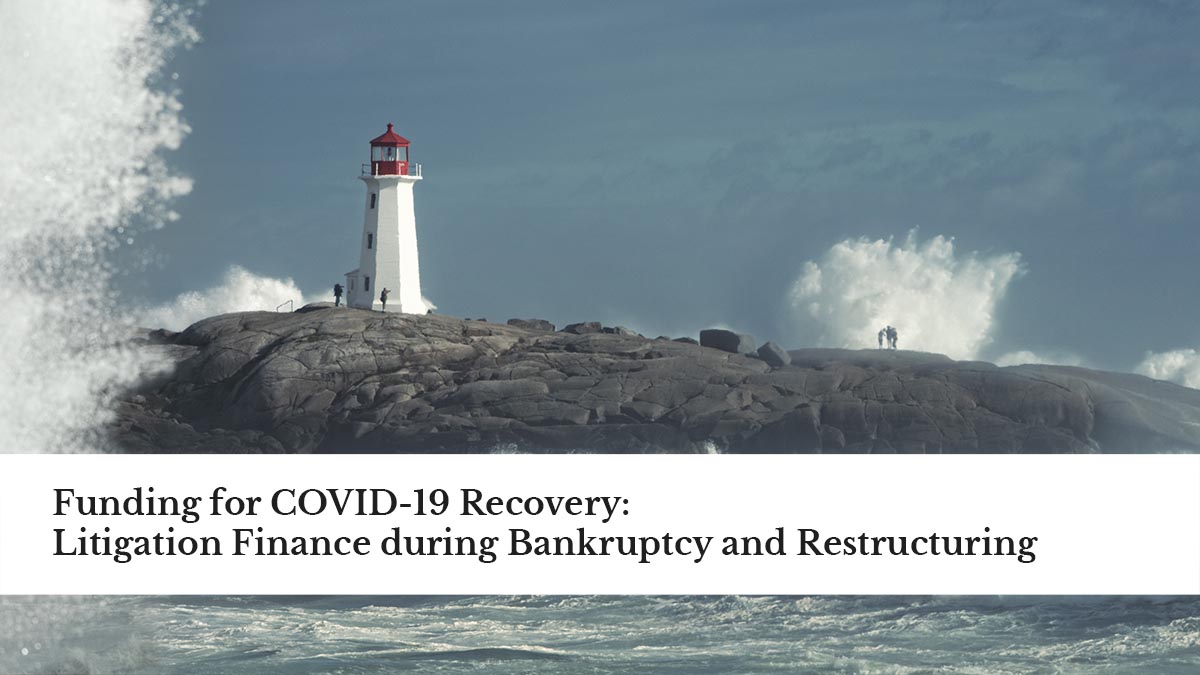July 23, 2020

With the rise in corporate bankruptcies as the economy reels from COVID 19 comes tough choices for companies in distress and the trustees that represent them. Should they spend precious limited capital to take meritorious claims to trial, or settle for pennies on the dollar? How can they hire the best trial counsel to pursue those claims when legal fees are beyond the company's constrained budget? What would a loss mean for the restructuring process, in light of creditors fighting over limited company assets? Litigation finance can provide solutions for companies grappling with these issues in the bankruptcy context.
Since January, more than 3,600 companies in the U.S. have declared bankruptcy, including 609 in the month of June alone. Chapter 11 filings are up 26% year over year and many more companies are in pre-filing negotiations with creditors. No sector has been spared, with companies in the energy, retail, travel, hospitality, and health care industries being the hardest hit. With $24 billion in liabilities, Hertz Global filed for bankruptcy in May after travel restrictions left it unable to pay for its fleet of rental cars. Chesapeake Energy, which pioneered the practice of hydraulic fracturing in the oil and gas industry, hit Chapter 11 on June 28, seeking to cut $7 billion in debt. J.C. Penney, Neiman Marcus, and J.Crew have all filed under Chapter 11, as has 24 Hour Fitness and Quorum Health Corporation. As these companies look to restructure, they need to maximize the value of their estates. This includes guaranteeing the best distribution of assets to their various stakeholders, and ensuring that they are well-positioned coming out of bankruptcy. It is a complicated process fraught with tough choices for board members and trustees appointed to oversee the restructuring.
Litigation can be essential to a corporate restructuring and a vital means of recovering assets for creditors. Often companies entering Chapter 11 have strong claims stemming from pre-bankruptcy events. Furthermore, claims may arise during the course of the bankruptcy or as a result of it, including claims related to the restructuring itself. Many of the companies that have filed bankruptcy this year have pending litigation that includes valuable claims. But oftentimes, capital to pursue good claims is limited or there is pressure to settle for less than the claims are worth. And distressed companies may be restricted in their choice of counsel if they are unable to cover fees for pursuing litigation.
As a distressed company and its trustees face the tough choice of whether to pursue litigation in the context of bankruptcy, litigation finance is a tool that can solve some of their toughest issues.
In a litigation finance transaction, a funder provides non-recourse capital to litigate a case or set of cases and in exchange, takes a pre-negotiated return from any settlement or damages award. The company uses the capital to hire the best lawyers and pursue the claims to trial, without being hindered by cost constraints or forced to settle early for a fraction of the recovery. But the funder will only recover if the case is successful. If not, the funder does not recover its capital and the company has no obligation to repay (unlike a loan or other source of financing). In that instance, the company has not depleted precious capital or reduced the assets available to creditors.
Funding can be provided on a single-case basis, or for a portfolio of cases if the company has a high volume of litigation. Portfolio funding offers several advantages including higher amounts of capital provided to the company, better pricing from the funder because of diversified risk, and the opportunity for the company or trustee to cover the costs of both plaintiffs-side and defense cases. Funding can also be used to monetize a judgment that is on appeal or in the enforcement process, infusing much-needed cash into the company while the case continues on the path to resolution.
Litigation finance can also be a source of working capital or funds to manage the estate. While funding is collateralized by a company's litigation, a company is not constrained to use the money only for legal fees. It can also use the funds for business purposes, including paying the costs to administer the estate or to maintain the business.
Overall, for companies in distress making tough choices, funding should be considered as it provides a new suite of financing options for corporate debtors, the ability to bring good claims to trial, and the opportunity to maximize the company's assets.